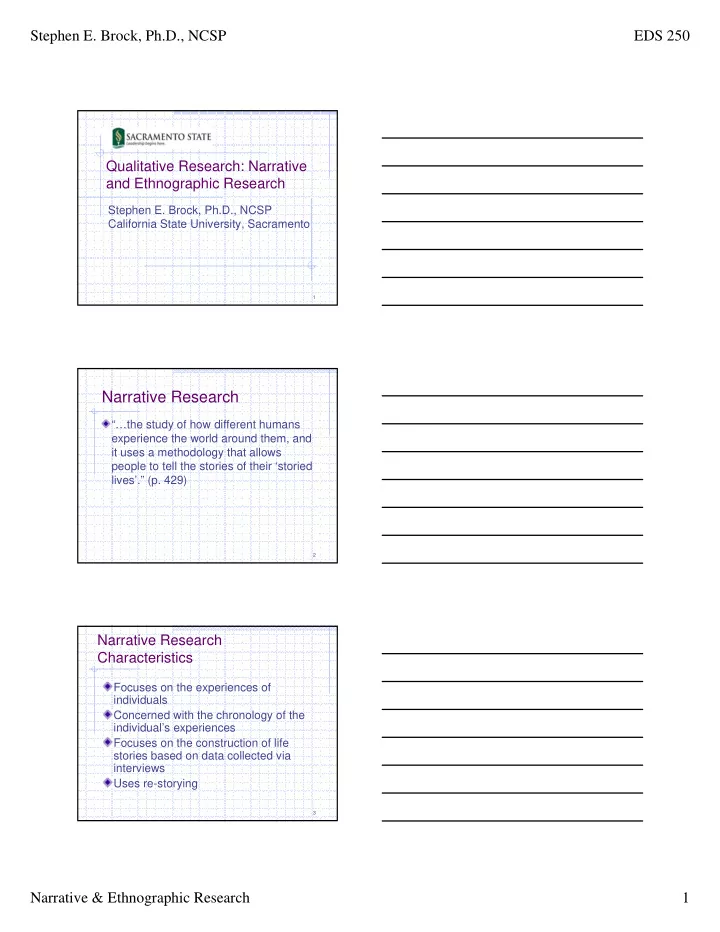

Stephen E. Brock, Ph.D., NCSP EDS 250 Qualitative Research: Narrative and Ethnographic Research Stephen E. Brock, Ph.D., NCSP California State University, Sacramento 1 Narrative Research “…the study of how different humans experience the world around them, and it uses a methodology that allows people to tell the stories of their ‘storied lives’.” (p. 429) 2 Narrative Research Characteristics Focuses on the experiences of individuals Concerned with the chronology of the individual’s experiences Focuses on the construction of life stories based on data collected via interviews Uses re-storying 3 Narrative & Ethnographic Research 1
Stephen E. Brock, Ph.D., NCSP EDS 250 Narrative Research Characteristics Incorporates context and place in the story Is collaborative (researcher & participants construct the narrative together) Always involves responding to the question, “And then what happened?” 4 Narrative Research Techniques Restorying Narrative analysis Oral history Artifacts Storytelling Letter writing Autobiographical and biographical writing 5 Beginning a Narrative Research Project How many of you have taught students with ADHD? Would you be willing to have a classmate interview you for 15 minutes? Such discussion would allow the classmate to begin to understand the “experiences” that you feel have shaped the way you work with these students. 6 Narrative & Ethnographic Research 2
Stephen E. Brock, Ph.D., NCSP EDS 250 Getting Qualitative Research Project Started Narrative Data Analysis Themes? 1 2 3 4 New questions? 1 2 3 4 7 Ethnographic Research “… the study of the cultural and patterns and perspectives of participants in their natural settings.” (Gay et al., 2006, p. 441) 8 Ethnographic Research Process 1. Identify the purpose of the research 2. Frame the study as a larger theoretical, policy, or practical problem 3. Pose initial research questions 4. Describe the overall approach and rationale for the study 5. Describe the site and sample selection 9 Narrative & Ethnographic Research 3
Stephen E. Brock, Ph.D., NCSP EDS 250 Ethnographic Research Process 6. Describe the researcher’s role 7. Describe data collection methods 8. Describe appropriate strategies for data analysis/interpretation 9. Write the research report 10 Key Characteristics of Ethnographic Research Conducted in natural settings (not labs) Involves intimate, face-to-face interaction Reflects participant’s perspective/behavior Uses inductive, interactive, & repetitious collection of unstructured data Data primarily collected via fieldwork Uses multiple methods (interview, observation, artifact collection) Frames behaviors/beliefs within a sociopolitical/historical context 11 Key Characteristics of Ethnographic Research Culture is considered a lens through which to interpret results Strives to understand the nature of social phenomena Studies a small number of cases in depth Requires researchers to be reflective about their impact Interprets actions and behaviors via what they actually do and their reasons for doing it. 12 Narrative & Ethnographic Research 4
Stephen E. Brock, Ph.D., NCSP EDS 250 Ethnographic Research Techniques Triangulation Participant observation Active participant observer Privileged, Active observer Passive observer Field Notes 13 Ethnographic Research Techniques Observing and recoding everything you possibly can Observing and looking for nothing in particular Looking for “bumps” or paradoxes 14 Last Class Meeting Writing and Evaluating Research Read Educational Research Chapters 22 & 23 Any missing portfolio elements must be turned in by 4pm, Tuesday May 14 15 Narrative & Ethnographic Research 5
Recommend
More recommend